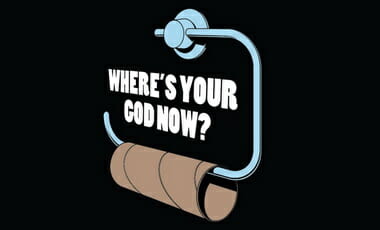This first of two older papers/posts was written back in 2010. I used part of it for a few posts over the years (as there is a 2012 connection in it), but have it in a neat package here. BTW, footnote #9 is a great quote, enjoy:
Stemming the Tide
The third article in the Humanist Manifesto II begins:
“We affirm that moral values derive their source from human experience. Ethics is autonomous and situational, needing no theological or ideological sanction. Ethics stems from human need and interest.”[1]
For the secular person, man himself is the only standard by which his own behavior is to be assessed, man is the measure of all things. Man is to be the sole arbiter in all matters of justice and law, right and wrong. In the words of the Encyclopedia Americana, “Since there is no God, man is the creator of his own values.”[2]
The British author John Hick bluntly asserts, “There is no God; therefore no absolute values and no absolute laws.”[3] Friedrich Nietzsche agreed: “…the advantage of our times, nothing is true, everything is permitted.”[4] The American scholar David F. Wells says of our nation that “[t]his is the first time that civilization has existed that, to a significant extent, does not believe in objective right and wrong. We are traveling blind, stripped of our own moral compass.”[5] Secular Humanist Paul Kurtz believes that, “The moral principles that govern our behavior are rooted in habit and custom, feeling and fashion,”[6]
How can anything be commended as being right, or condemned as being wrong?
Outside of these philosophers and professors, is there any precedence for this in law here in the United States to support such an insertion of cultural relativism? (Of course there is, otherwise I wouldn’t ask it.) In Planned Parenthood v. Casey (1996), the 9th District Appeals Court wrote:
At the heart of liberty is the right to define one’s own concept of existence, of meaning, of the universe and of the mystery of human life. Beliefs about these matters could not define the attributes of personhood were they formed under compulsion of the State.[7]
In other words: whatever you believe is your origin legally allows you to designate meaning on both your life and body. If you believe that the child growing in you isn’t a child unless you designate it so, you may seek an abortion at any time during the pregnancy. Thus reinforcing Roe v. Wade and Doe v. Bolton to the outer reaches of insanity. The woman alone can choose to or not choose to designate life to that “fetus.” It isn’t a “potential person” until the mother says it is. She becomes the potential for that person in other words.
Understand? That clarified and said, what commonality does this thinking have to the following historical quote:
If relativism signifies contempt for fixed categories and men who claim to be bearers of an objective, immortal truth… From the fact that all ideologies are of equal value, that all ideologies are mere fictions, the modern relativist infers that everybody has the right to create for himself his own reality…
Sounds really close to the 9th Circuit’s majority view and many of the secular humanists quoted, doesn’t it? The above is basically saying in a nutshell that your opinion is just as valid as another persons opinion because both your’s and the other person’s perspective on something is formed from influences from your culture and experiences. So someone from New Guinea for instance may have a differing view or opinion on eating dogs than an American.
Let’s compare a portion from both the 9th Circuit and the so far mysterious historical quote before revealing the source of said quote:
- “At the heart of liberty is the right to define one’s own concept of existence, of meaning, of the universe and of the mystery of human life…“
- “…the modern relativist infers that everybody has the right to create for himself his own reality…”
Whether you’re an atheist, Buddhist, Hindu, Christian or Muslim, it doesn’t matter. Your reality is internal rather than a reaction to truth outside yourself. Obviously I am up to something, so I will let the cat out of the bag — much to PETA’s surprise. Ready?
Everything I have said and done in these last years is relativism by intuition…. If relativism signifies contempt for fixed categories and men who claim to be bearers of an objective, immortal truth… then there is nothing more relativistic than fascistic attitudes and activity…. From the fact that all ideologies are of equal value, that all ideologies are mere fictions, the modern relativist infers that everybody has the right to create for himself his own ideology and to attempt to enforce it with all the energy of which he is capable.[8]
This is how Mussolini defined Fascism. I would argue that the only place real fascism dwelt for any time was in Italy… whereas in Germany you had a strange mix of Germanic occultic pantheism and angst.[9] So how does one define this new tyranny? Isn’t tyranny caused by religions?
Is there a growing sentiment on the Progressive Left in their philosophical materialism [absolute metaphysics] coupled with their historical memories some resentments [Utopia failed again] and some derangement in their fanaticism [violence] that are driving a decade long violent trend toward conservatism and the values we posit are closer to the mores of this country’s founding?
Is there a tyranny brewing?
Maybe not like we expect, but there definitely is a culture war going on, and in November the other side is set to lose some ground in it. So be prepared for more ad hominem attacks and straw-men being torn down viciously. I likewise think the culmination of this angst via a particular world view and an absolute metanarrative* may soon be realized in more loony left activity that may be violent. Melanie Phillips speaks to its historical roots and its current hold:
…the French Revolution and the Terror unleashed by it presented the inescapable evidence that the Enlightenment, far from consigning murderous obscurantism to the dustbin of history, contained powerful strands from the start that would merely secularize tyranny. In the twentieth century, the political totalitarianism of communism and fascism, although overtly antireligious, echoed the premodern despotism of the church by declaring themselves the arbiters of a totalizing world-view in which all dissent would be crushed. Now, with both communism and fascism defeated, the West has fallen victim to a third variation on the theme of totalitarianism: not religious or political this time, but cultural. It is what J. L. Talmon identified back in 1952 as “totalitarian democracy,” which he characterized as “a dictatorship based on ideology and the enthusiasm of the masses.”‘
If religious totalitarianism was rule by the church and political totalitarianism was rule by the “general will;’ cultural totalitarianism is rule by the subjective individual, freed from all external authority and constraints. Morality is privatized so that everyone becomes his or her own moral authority, while the laws and traditions rooted in Christianity and the Hebrew Bible have come under explicit attack. The old order of Western civilization, resting on the external authorities of religion and culture, has to be destroyed. With no order or purpose in the world, moral and cultural relativism are the rule; any attempt to prioritize any culture or lifestyle over any other is illegitimate. The paradox–and it is acute–is that this relativist doctrine itself assumes the form of a dogmatic moralizing agenda that takes an absolutist position against all who challenge it and seeks to stamp out all deviations.[10]
The question must be asked then: is this secularizing of society and personalizing of moral truths building a healthy society or not? That is for you to decide ultimately. However, tell me if you want your kids going through what John Dewey — who some say is the father of the modern public school system — many years ago alluded to:
There is no God and no soul. Hence, there are no needs for props of traditional religion. With dogma and creed excluded, then immutable [i.e. unchangeable] truth is also dead and buried. There is no room for fixed, natural law or permanent moral absolutes.[11]
This obfuscation and rejection of an absolute moral model (actually, a replacing of one for the other) blurs that center point society tries, or should be trying, to aim for. This rejection can have — as history has shown — a “relentless and cruel”[12] outcome. Tammy Bruce, herself a homosexual/pro-choice author, points to the importance of fighting this tide of secularism with that ethic that is close to the conservatives heart, as it was close to the Founders heart:
Even if one does not necessarily accept the institutional structure of “organized religion,” the Judeo-Christian ethic and the personal standards it encourages do not impinge on the quality of life, but enhance it. They also give one a basic moral template that is not relative,” which is why the legal positivists of the Left are so threatened by the Natural Law aspect of the Judeo-Christian ethic.[13]
Professor Alister McGrath (Ph.D in molecular biophysics and a Doctor of Divinity) makes no qualms that this is no less than a Nihilistic grab for power, “as The illiberal imposition of this pluralistic metanarrative on religions is ultimately a claim to mastery – both in the sense of having a Nietzschean authority and power to mold material according to one’s will, and in the sense of being able to relativize all the religions by having access to a privileged standpoint.”[14] In other words, elitism pouring in from the Progressive Left, as usual.
Here is a mock conversation to illustrate [and end] my point in regards to the absolute value in cultural and moral relativism. Enjoy:
Teacher: “Welcome, students. This is the first day of class, and so I want to lay down some ground rules. First, since no one person has the truth, you should be open-minded to the opinions of your fellow students. Second… Elizabeth, do you have a question?”
Elizabeth: “Yes I do. If nobody has the truth, isn’t that a good reason for me not to listen to my fellow students? After all, if nobody has the truth, why should I waste my time listening to other people and their opinions? What’s the point? Only if somebody has the truth does it make sense to be open-minded. Don’t you agree?”
Teacher: “No, I don’t. Are you claiming to know the truth? Isn’t that a bit arrogant and dogmatic?”
Elizabeth: “Not at all. Rather I think it’s dogmatic, as well as arrogant, to assert that no single person on earth knows the truth. After all, have you met every single person in the world and quizzed him or her exhaustively? If not, how can you make such a claim? Also, I believe it is actually the opposite of arrogance to say that I will alter my opinions to fit the truth whenever and wherever I find it. Moreover, if I happen to think that I have good reason to believe I do know truth and would like to share it with you, why wouldn’t you listen to me? Why would you automatically discredit my opinion before it is even uttered? I thought we were supposed to listen to everyone’s opinion.”
Another student blurts out: “Ain’t that the truth.”[14]
FOOTNOTES
[1] James Sire, The Universe Next Door: A Basic Worldview Catalog, 3rd. edition (Downers Grove, IL: InterVasity Press, 1997), 62.
[2] Robert Morey, The New Atheism and the Erosion of Freedom (Phillipsburg, NJ: P&R Publishing, 1986), 63.
[3] Ibid.
[4] Albert Camus, The Rebel (trans. Anthony Bower. Harmondsworth, London: Penguin Books, 1962), 58.
[5] David F. Wells, Losing Our Virtue: Why the Church Must Recover Its Moral Vision (Grand Rapids, MI: Wm. B. Eerdmans Publishing Company, 1999), 17.
[6] William Lane Craig, Reasonable Faith: Christian Truth and Apologetics, 3rd edition (Wheaton, IL: Crossway Books, 2008), 175.
[7] Planned Parenthood of Southeastern Pennsylvania v. Casey, 505 U.S. 833 (1992), section II. Available in electronic format at www.caselaw.lp.com/scripts, [cited 11 June 2003].
[8] Mussolini, Diuturna pp. 374-77, quoted in Peter Kreeft, A Refutation of Moral Relativism: Interviews with an Absolutist (San Francisco, CA: Ignatius Press, 1999) 18.
[9] Melanie Phillips points this out in her newest book:
As Isaiah Berlin noted, the terrible consequences of this thinking were foreseen as early as 1832 by the German poet Heinrich Heine. He warned that one day the Germans, fired by a combination of absolutist metaphysics, historical memories and resentments, fanaticism and savage fury, would destroy Western civilization. Berlin recorded Heine as predicting that
“Implacable Kantians … with axe and sword will uproot the soil of our European life in order to tear out the roots of the past. Armed Fichteans will appear… restrained neither by fear nor greed… like those early Christians whom neither physical torture nor physical pleasure could break.” And most terrible of all would be Schelling’s disciples, the Philosophers of Nature who, isolated and unapproachable beyond the barriers of their own obsessive ideas, will identify themselves with the elemental forces of “the demonic powers of ancient German pantheism”
The World Turned Upside Down: The Global Battle Over God, Truth, and Power (New York, NY: Encounter Books, 2010), 269.
[10] Ibid., 98-99
[11] Dustin Guidry, Turning the Ship (Xulon Press [self-publishing], 2009), 38.
[12] “I freed Germany from the stupid and degrading fallacies of conscience and morality…. We will train young people before whom the world will tremble. I want young people capable of violence — imperious, relentless and cruel” ~ Hitler, from a plaque hung on the wall at Auschwitz; in Ravi Zacharias, Can Man Live Without God (Nashville, TN: W Publising Group, 1994), 23.
[13] Tammy Bruce, The Death of Right and Wrong: Exposing the Left’s Assault on Our Culture and Values (Roseville, CA: Prima, 2003), 35.
[14] Francis Beckwith & Gregory Koukl, Relativism: Feet Planted in Mid-Air (Grand Rapids, MI: Baker Books, 1998), 74.
*Metanarratives, or, Grand Narratives – “big stories, stories of mythic proportions – that claim to be able to account for, explain and subordinate all lesser, little, local, narratives.” Jim Powell, Postmodernism for Beginners (New York, NY: Writers and Readers, 1998), 29.
And here is a post I did on my free BLOGSPOT BLOG May 18, 2007. My Microsoft Word document dates from 2002, so this was a debate I had at Space Battle’s forums many years ago. Which is why there are no footnotes.
Atheism a Religion?… Say What!
The United States does not have an established church, but it does have (and always has had) an established religion, or at least a dominant religious philosophy, an established way of thinking.
What is religion and can it be defined? I will attempt to do so for the purpose of “clarifying terms.” The best term I feel is applicable to religion is this:
Religion may be defined as a way of thinking about ultimate questions. A persons religion answers questions such as how and why (and everything else) came into existence, whether the purpose of life has been established by a Creator or is up to us to decide, and how we can have reliable knowledge (revealed by God or revealed by Nature) about the world and about ourselves.
The officially recognized answers to these questions make up a society’s established religious philosophy, its culturally dominant way of thinking about origins. But let us look at what some dictionaries say about faith and religion.
- Webster’s New World Dictionary: defines religion as “a specific system of belief, worship, often involving a code of ethics.” Faith is defined as “unquestioning belief… complete trust or confidence… loyalty.”
- Funk and Wagnalls Standard Desk Dictionary: has this to say about religion, “The beliefs, attitudes, emotions, behavior, etc., constituting man’s relationship with the powers and principles of the universe.” On the matter of faith it says, “Confidence in or dependence on a person, statement, or thing as trustworthy… Belief without need of certain proof.”
There is nothing sinister or inherently unconstitutional about the existing of a de facto established public philosophy on religious questions (such as origins and mans purpose). The philosophy is established not in the sense that it is formally enacted or that dissenters are subject to legal punishment (although in recent years this has started to happen), but in the sense that it provides a philosophical basis for lawmaking and public education, in law school this is taught as “public policy.” For example, one culture may endeavor to encourage its schoolgirls to look forward to lives as mothers and homemakers, while another may encourage them to reject traditional gender stereotypes and pursue formally masculine careers. To encourage either choice reflects a dominant public philosophy about human nature and gender roles. Similarly, any community that operates a public school system must have a policy of some kind concerning, say, sexual morality, even if the policy is merely to encourage adolescents to choose for themselves. Relativism itself is a policy choice, it rests on assumptions about reality, and “man’s relationship with the powers and principles of the universe” as Funk and Wagnalls says.
Soldiers use to march to the “Battle Hymn of the Republic” – a song that is banned from most public schools today. Some people would say we, as a Nation, have become neutral about religion. The evidence, however, points to one philosophy replacing another. Lets see if we can glean what this new religious belief is that so dominates the Western hemisphere now.
For instance, the public schools have become a battleground for religion. John Dunphy, a secular humanist, wrote in the HUMANIST magazine:
“I am convinced that the battleground for humankind’s future must be waged and won in the public school classroom by teachers who correctly perceive their role as the proselytizers of a new faith; a religion of humanity that recognizes and respects the spark of what theologians call divinity in every human being. These teachers must embody the same selfless dedication as the most rabid fundamentalist preacher, for they will be ministers of another sort, utilizing a classroom instead of a pulpit to convey humanist values in whatever subjects they teach regardless of the educational level – preschool daycare or large state university. The classroom must and will become an arena of conflict between the old and the new – the rotting corpse of Christianity together with all its adjacent evils and misery…”
John Dewey, the father of modern education, hoped to replace sectarian religion with “a religious faith that shall not be confined to sect, class, or race.” The religion envisioned by Dewey is that of secular humanism. The Supreme Court has even recognized it as a religion (Torcaso v. Watkins). This is why there are tax free atheist churches with “pastors” and “counselors.”
The HUMANIST MANIFESTO was signed by many of the prominent atheistic and evolutionary educators of the day. Among its signers were John Dewey, Harry Elmer Barnes, C. F. Potter and John Herman Randall. The manifesto called for a radical change in religious perspectives. A religion adequate to the twentieth century regards the universe as self-existing, not created, and regards man as part of nature evolved in its processes. Mind-body dualism, supernaturalism, theism, and even deism are rejected. The goal of life is the realization of human personality.
Social and mental hygiene are priority items. Social control is a means to the abundant life for all. That statement was updated in 1973 by a HUMANIST MANIFESTO II, which adds an additional emphases on human responsibility toward humanity as a whole, “a specific system of belief, worship [of man], often involving a code of ethics” as Webster puts it.
This is one of the catalysts that brought Judge Pendergerst of the Baltimore Superior Court to say:
“It is abundantly clear that the petitioner’s real objective is to drive every concept of religion out of the public school system. If God were removed from the classroom, there would remain only atheism [secular humanism: a religion]. The word is derived from the Greek atheos, meaning ‘without a God.’ Thus the beliefs of virtually all pupils would be subordinated to those of Madalyn Murray.”


















































































